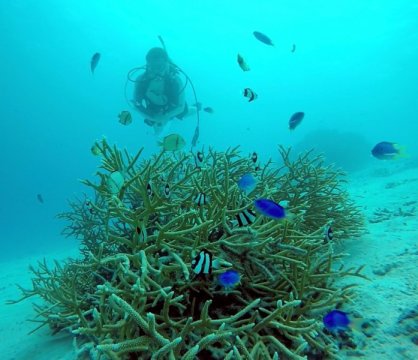[ad_1]
Coral-algal partnerships have endured numerous climate change events in their long history, and at least some are likely to survive modern-day global warming as well, suggests an international team of scientists.
The team’s conclusion is based on the finding that the relationship between corals and the mutualistic micro-algae that enable them to build reefs is considerably older and more diverse than previously assumed.
“Past estimates placed the initiation of these symbiotic relationships at 50 to 65 million years ago,” said Todd LaJeunesse, associate professor of biology, Penn State. “Our research indicates that modern corals and their algal partners have been entwined with each other for much longer — since the time of the dinosaurs, approximately 160 million years ago. During their long existence, they have faced severe episodes of environmental change, but have managed to bounce back after each one.”
According to LaJeunesse, the micro-algae, commonly called zooxanthellae — of the dinoflagellate family Symbiodiniaceae — live inside the cells of corals, allowing them to acquire energy from sunlight and to build the massive, economically valuable reef formations upon which countless marine organisms rely for habitat.
“The fossil record shows that today’s reef-building corals exploded in diversity around 160 million years ago,” said LaJeunesse. “Finding that the origin of the algal symbionts corresponds to major increases in the abundance and diversity of reef-building corals implies that the partnership with Symbiodiniaceae was one of the major reasons for the success of modern corals.”
The team used genetic evidence — including DNA sequences, phylogenetic analyses and genome comparisons — to calculate the micro-algae’s approximate age of origin. They also used classical morphological techniques in which they compared visual characteristics of these symbionts using light and electron microscopy, along with computer modeling and other methods, to discover that in addition to being older, the algae family is far more diverse than previously perceived. The results appear online today (Aug. 9) in Current Biology.
“Presently, numerous algal lineages, called clades, are lumped into just one genus,” said John Parkinson, postdoctoral researcher, Oregon State University. “Using genetic techniques, we provide evidence that the family actually comprises at least 15 genera, including hundreds and possibly thousands of species worldwide.”
This is important, he explained, because some micro-algal symbionts have characteristics that make them more resilient to changes in the environment than other symbionts.
“The updated naming scheme offers a clear framework to identify different symbionts,” said Parkinson. “Accurate taxonomy (the identification and naming of species) is a critical step in any biological research. This is especially true for studies attempting to understand how the partnership between reef corals and their micro-algae, which are needed for survival and growth, may adapt to climate change. For example, when many corals are exposed to high temperatures they lose their symbiotic algae and die. Others are far more tolerant of heat, and some of this resilience is based on the species of algae they have.”
Parkinson noted that the team has been working for close to a decade to modernize coral symbiont taxonomy in order to improve communication among scientists and advance future research on reef corals.
“Until now, studies on the physiology and ecology of these algae attempted to compare apples to apples,” said Parkinson. “Considering how different some of them are, we now recognize that often we were comparing apples to oranges. These changes will help researchers to think more accurately about the comparisons they are making in experiments.”
Story Source:
Materials provided by Penn State. Note: Content may be edited for style and length.
[ad_2]















